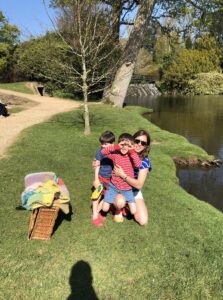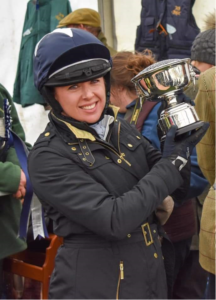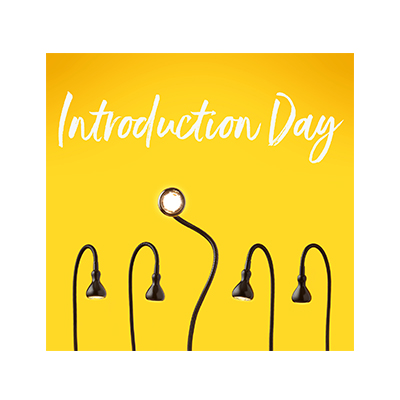 Curiosity about myself was completely non-existent until my thirties. I was the pragmatic, action-oriented type who cracked on with life; diligent, career-focused, and striving to make my way in a solid corporate job within a giant of the global banking industry. Having undergone the standard corporate psychometric profiling – Myers-Briggs and the like – I felt that I had a pretty good handle on myself. I moved through life in a somewhat passive way, taking opportunities as they presented themselves, and being moderately surprised when things worked out in my favour. I was an expert in corporate strategy and planning, but ironically, I scarcely undertook any conscious planning in relation to my own life!
Curiosity about myself was completely non-existent until my thirties. I was the pragmatic, action-oriented type who cracked on with life; diligent, career-focused, and striving to make my way in a solid corporate job within a giant of the global banking industry. Having undergone the standard corporate psychometric profiling – Myers-Briggs and the like – I felt that I had a pretty good handle on myself. I moved through life in a somewhat passive way, taking opportunities as they presented themselves, and being moderately surprised when things worked out in my favour. I was an expert in corporate strategy and planning, but ironically, I scarcely undertook any conscious planning in relation to my own life!
My life story seemed to be characterised by happenstance – the good things happening thanks to being in the right place at the right time, or so I thought. I was proud of what I had accomplished. But I began to feel that these were achievements I had never aspired to, or specifically articulated for myself. So, when I reached my mid-thirties and found myself in a failed relationship, this was the first indicator that I needed to begin to govern my own life with greater awareness and intention.
After the breakdown of my marriage, I’d found myself in a seemingly powerless, unhappy state, so I began to venture into the world of therapy. Seeking ‘help’ was an alien concept to my family, but I pushed myself to find support. Growing up, I had been encouraged always to count myself lucky, keep my chin up, keep the pain within, and soldier on through life’s challenges. As ostensibly fond, supportive and loving as my family structure was, self-curiosity and internal reflection were not part of its culture. It began to dawn on me that I needed to look at myself to effect the change I needed in my life.
I had also begun to realise that I was neglecting the things that brought me real joy. I had been a keen and competitive equestrian in my childhood, and yet since university, my favourite pastime did not have a proper place in my life. My hobby became subsumed by my relationships, and latterly by the parenting of two gorgeous little boys who had arrived in quick succession after I remarried. I had unwittingly put myself on hold, and was dutifully fulfilling an agenda that I had not consciously set for myself.
 Hoffman was suggested to me when dissatisfaction with my lot reared its head. I had begun to believe that unfavourable things were happening to me, and there was little I could do to stop them. What was I missing – why did I feel powerless in the important areas of my life like work and my relationship? Why wasn’t I protecting time for the things that energised me? Time to step off the hamster wheel of familial and career duty, and ask some searching questions of myself. I began to realise that I was standing in the way of my own happiness.
Hoffman was suggested to me when dissatisfaction with my lot reared its head. I had begun to believe that unfavourable things were happening to me, and there was little I could do to stop them. What was I missing – why did I feel powerless in the important areas of my life like work and my relationship? Why wasn’t I protecting time for the things that energised me? Time to step off the hamster wheel of familial and career duty, and ask some searching questions of myself. I began to realise that I was standing in the way of my own happiness.
My first attempt at greater self-determination came when I opted to switch sectors after my second son was born. After 20 years in finance, and having weathered the tumult of the 2008 crash, a return to the banking industry after maternity leave held little appeal. I decided to move to Bupa, which offered a happy medium between the familiar world of finance, and (for me) the more socially impactful world of healthcare. With new-found fulfilment in my work, and a more balanced life, I began to reap the rewards of this new deliberacy. I vowed to find additional new ways to chart my own course.
Happily, my husband Jamie had also been attracted to the Hoffman Process, and we made a pact to undertake it in parallel – as close to simultaneously as we could, given the constraints of looking after a young family and managing two full time careers. He was the first to make the solo journey to Florence House, the home of the Process in the south of England.
A week later, the boys and I welcomed Jamie home with some trepidation – in what ways would he have changed? In the vacuum of his absence, I wondered: would he experience some seismic revelation, decide to shake off his own corporate shackles, flee the City of London for the Highlands of Scotland, and pursue the simple life of a crofter? While I wanted to feel life change, I feared too heavy a dose! Jamie returned home centred, settled, and newly self-aware, if a little quiet. He was tight-lipped about the content of the Process and about the people he had met, not wishing to compromise or dilute my own forthcoming experience. It all felt rather mysterious.
My turn at Florence House came around two months later. I was fortunate that Bupa was supportive of me undertaking the Process, since the course is CPD-accredited. After my own week of self-discovery in Seaford, Jamie and the boys came to collect me. Having experienced the Process himself, Jamie was completely understanding of what I needed to do to reacclimatise gently. He and the boys helped me return to normal family life by treating me to a day in the tranquil, natural beauty of Sheffield Park in Sussex. We picnicked in broad, unseasonably hot Easter Saturday sunshine, ate ripe, juicy watermelon on a rainbow-coloured rug by the shimmering lake, and I was deliciously smothered by the adoration of my joyful, squealing sons. It remains a strikingly vivid and delightful recollection that I shall treasure forever. I felt light, calm and energised, filled with Hoffman magic.

Photo credit © David Bunn Photography.
So, what next? How could I harness this new-found energy, perception and self-insight in the real world? During the Process, I had set some highly specific goals for myself. This step felt unfamiliar – but very right, in the company of my facilitators and peers on the Process. My first concrete goal within the vision-setting exercise related to equestrianism, for I had come to realise that this was a vital source of nourishment for my ‘best self’. Months before the Process, I had submitted an entry for an amateur cross-country horse race which was due to take place only a week after the end of the Process. Despite a long competitive hiatus of 22 years, I set an intention to win.
On the day of the event, in wild spring storm conditions and surrounded by a field of semi-professional competitors far better prepared than I, a rusty mother-of-two, I went through the steps that I had learnt on my Process to centre myself and connect with all aspects of my being. I gave myself a new kind of verbal pep talk. I even gave my dear, borrowed horse a verbal pep talk. If anyone could have heard me above the howling gale, they might have thought I was having some kind of funny turn. But I felt no apprehension as we set off around the rather terrifyingly huge course of fences, amid the thundering hooves, flying clods and surging energy of 35 other horses and riders.
Seven and a half minutes later, we crossed the line, and I knew I had won. As I was presented with a gleaming silver cup, photographed and interviewed, I felt the soaring euphoria from the power of successfully harnessing my intentions.
Back on Planet Earth, in real, daily life, there are no shiny trophies for the taking – so the race was a specific, unique manifestation of the skills that I had learnt. In a more routine context, I feel that the Process has increased awareness in all areas of my life. I can give greater focus to my children; I can retain perspective on the inevitable bumps in life’s winding road; I have a deeper understanding of those close to me, and a new-found compassion for everyone else who walks this earth; I preserve time with my family, and treasure these relationships all the more fully. Above all, I have come away with the realisation that I don’t have to wait for others to change, or to step in and fix the situation; whatever I want is within me – all I have to do is to harness my own intentions.
My top 5 tips for getting the most from your Process
- The Hoffman team will advise you to take time after your Process before getting back into your normal life. Believe them. Your Process will take you very far away from your everyday obligations. Resurface slowly, and treasure the unique feelings that you will experience in the days that follow.
- Try to spend time in nature in some way, immediately after your Process. Avoid travelling to or through populated places; your senses will have been heightened, and cities or man-made spaces (airports, train stations etc) will feel jarring. Nurture the unique feelings that will have come to the surface during your Process.
- Time spent preparing for the Process is time well spent. It will help you to get the most out of it. The pre-Process coursework is key to ascertaining the specific areas in your life requiring attention.
- If you have small children, help them to feel comfortable with your absence by pre-recording a few short video messages for them on your phone that can be shared with them while you’re away.
- If you are part of a couple, consider the benefits of both of you undertaking the Process over time. It provides a common language and a new level of mutual understanding.
Thank you to Tessa for sharing her Hoffman Process Story. You can read more from people who have done the Hoffman Process in our archive here.






 Sign up to receive monthly newsletters from Hoffman
Sign up to receive monthly newsletters from Hoffman